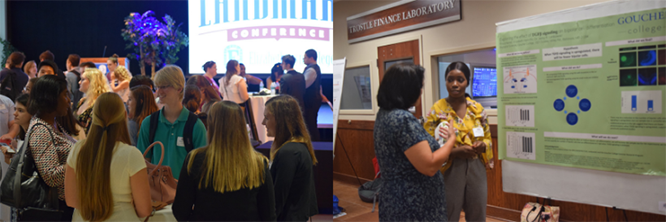Location
Poster Presentations
Department
Biology
Start Date
11-7-2019 2:45 PM
End Date
11-7-2019 3:45 PM
Description
Fecal Matter Transplants (FMT) are often used as a last resort treatment for patients who have a C. diff infection. Clostridium difficile (C. diff) is a common hospital-acquired pathogen which replaces healthy bacteria in the GI tract and disrupts their normal function. Due to antibiotic overuse, C. diff often resurfaces after antibiotic treatment. In order to more effectively treat C. diff and other bacterial diseases or infections, other methods of treatment should be utilized. FMT’s use stool samples from healthy individuals to reestablish the microbiota in the gut after an infection occurs. Because of U.S. Food and Drug Administration regulations and social stigma, antibiotic treatments are the preferred method to treat C. diff. In order to reduce the social stigma surrounding FMT’s, research of further methods of fecal matter preservation could lead to a more personalized stool banking process. Utilization of personally banked stool samples could more effectively reintroduce naturally growing bacteria in the gut and decrease the chance of illness after treatment. Previous data verifies the preservation of DNA in samples that have been stored. However, the viability of the cells was unknown. The focus of the conducted research this summer was to test the viability of cells using stool samples donated by dogs. Samples were stored at -80oC in four different conditions for three weeks to determine the best method for cell preservation. Our goal was to identify the method that best retains cell function. To measure the metabolic activity of living cells after storage, BioLOG plates were used. Analysis of the data collected from the BioLOG plates will help to determine cell viability and assist in supporting further preservation methods in the future.
Recommended Citation
Ruiz, Caroline Veronica and Workman, Celeste, "Examining Preservation Methods for Long-Term Fecal Matter Storage" (2019). Landmark Conference Summer Research Symposium. 9.
https://jayscholar.etown.edu/landmark/2019/july11/9
Included in
Examining Preservation Methods for Long-Term Fecal Matter Storage
Poster Presentations
Fecal Matter Transplants (FMT) are often used as a last resort treatment for patients who have a C. diff infection. Clostridium difficile (C. diff) is a common hospital-acquired pathogen which replaces healthy bacteria in the GI tract and disrupts their normal function. Due to antibiotic overuse, C. diff often resurfaces after antibiotic treatment. In order to more effectively treat C. diff and other bacterial diseases or infections, other methods of treatment should be utilized. FMT’s use stool samples from healthy individuals to reestablish the microbiota in the gut after an infection occurs. Because of U.S. Food and Drug Administration regulations and social stigma, antibiotic treatments are the preferred method to treat C. diff. In order to reduce the social stigma surrounding FMT’s, research of further methods of fecal matter preservation could lead to a more personalized stool banking process. Utilization of personally banked stool samples could more effectively reintroduce naturally growing bacteria in the gut and decrease the chance of illness after treatment. Previous data verifies the preservation of DNA in samples that have been stored. However, the viability of the cells was unknown. The focus of the conducted research this summer was to test the viability of cells using stool samples donated by dogs. Samples were stored at -80oC in four different conditions for three weeks to determine the best method for cell preservation. Our goal was to identify the method that best retains cell function. To measure the metabolic activity of living cells after storage, BioLOG plates were used. Analysis of the data collected from the BioLOG plates will help to determine cell viability and assist in supporting further preservation methods in the future.




Comments
Faculty mentor: Debra Wohl